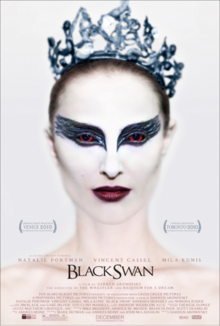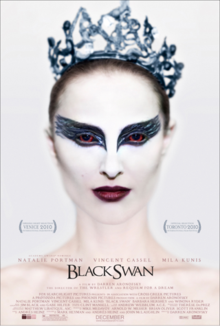Darren Aronofsky’s backstage ballet thriller, Black Swan, is a wonderfully bizarre and compellingly engrossing masterpiece. Starring Natalie Portman Mila Kunis, Black Swan is more than a simple drama about the cutthroat world of professional dancing. Instead of invoking the traditional clichés that imbue the litany y of previous dancing films, Black Swan transcends into the realm of absurdity and complete shock-and-awe. It is disturbing, shocking and I simply could not take my eyes off of the scene during the entire film.
Portman portrays Nina, a virginal, repressed and almost doll-like dancer who is under a tremendous pressure, from herself and others, to secure the lead in her company’s rendition of Swan Lake. The lead in Swan Lake is that of a dual role (the White/Black Swan), representing both virginal and duplicitous qualities. Nina is a technically gifted dancer and had no problem of filling the repressed role of the White Swan; however, she lacks the emotional sensuality needed for the Black Swan. In an act of rebellion, Nina momentarily succumbs to the sexual advances of the company’s director, which secures her the lead. As a result, Nina is forced to deal with the treachery of her fellow dancers, all while embarking on a friendship, rivalry, and graphically sexual relationship, all at once, with Lily, a free spirited dancer in the corps (Mila Kunis).
The majority of the film deals with Nina’s struggle to escape her repression and to succumb to the dark, sensual side needed to convincingly portray the Black Swan. Portman is so creepily convincing as Nina, that is easy to see why there is a great deal of Oscar buzz surrounding her performance.
The movie is more than just a simple dance drama. Aronofsky pushes the visually gruesome aspects of professional dance to the extreme. His choice to film using a shaky, handles camera serves to highlight the stark, bleak and gritty aspects of Nina’s world. Every broken bone, bloodied toenail and bout of bulimia is shown in disturbing detail. There are at least a dozen graphic scenes that easily evoke shrieks from the audience.
As the film progresses, Nina becomes more and more psychologically disturbed as her world continues to unravel. Nina hallucinates on such massive scale, that you would think she is high on every drug known to man. It is difficult for the audience to discern reality from the disturbingly violent psychological trauma. We the audience see many of the hallucinations from Nina’s perspective, which serves to ramp up the drama and pure creepiness. As a result, the film is able to pull off so many twists and turns that it’s almost whiplash inducing.
At its core, Black Swan is about a group of people who are pushed to extremes. The emotional and psychological violence of ballet resonates throughout the entire film. Despite the nightmarish quality of Nina’s world, there is something relatable about her struggles. This could be due to Portman’s performance or simply because the story is about the horrible struggles that people must face in order to find themselves.
In the end, Black Swan far exceeded my expectations. The dancing highlighted was crisp and beautiful, while the psychological trauma of Nina was utterly fascinating, making this a must-see-film.
– Chris Heide















